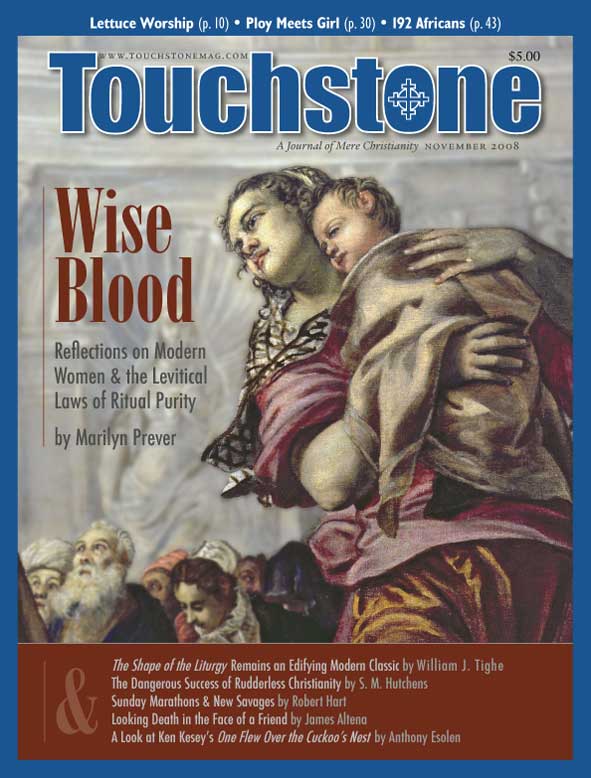Tired of Life?
Or It Seems Less Like a Garment Now
There has been a steady campaign by some Christians who regard themselves as orthodox and conservative to persuade the rank and file of their Christian brothers and sisters to rethink their predictable support for political candidates who are pro-life. They bring other issues to the fore—war, torture, taxes, education, health care, and poverty—in an attempt to undermine the claim that conscientious Christians must always support pro-life candidates. They imply that such “single-issue” pro-life voting is unsophisticated, often in lockstep with the mostly uneducated “religious right,” and perhaps not even very moral in the long view.
The inclusion of other issues with abortion is, of course, an expression of the “seamless garment” argument advanced by the late Joseph Cardinal Bernardin in 1983. If there are no seams, no discernible boundaries when it comes to “life issues”—which, according to this argument, encompass all aspects of our lives, including our “quality of life”—then disrespect for or the abuse of life in one area will eventually have an effect on all the other areas. One must have, as Bernardin put it, a “consistent ethic of life.” A seamless garment will be ruined by any tear.
But in the political sphere, the promoters of the seamless garment approach to life issues do not actually exhibit the consistency they preach. Many of them do give priority to some issues over others and disagree among themselves on which issues should be considered paramount. And it is tellingly obvious that some support the seamless garment idea because it gives them cover for downplaying or ignoring abortion.
The image of the seamless garment, of course, is taken from the Passion of our Lord, when the soldiers of the state who were executing Jesus cast lots for his seamless robe rather than tear it in four pieces. The bishop and martyr Cyprian of Carthage, writing in the mid-third century, used the seamless garment of Christ as a symbol of the unity of the church. Unity is, by definition, never unity unless it is whole, without division.
It is ironic, then, to call for a “consistent ethic of life” when that ethic produces no unity of witness among Christians themselves. Attempts to promote this supposedly more nuanced ethic in politics has undermined Christian witness because what should be the seamless garment of the Church’s witness is so unraveled and frayed as to be incoherent to the world. The lack of consistent witness is all the world can see.
Consistent Through Time
The solution to this contemporary confusion is to embrace what we can clearly see as the consistent ethic of life through time. The Church, after all, is the mystical Body of Christ, which exists in its unity through all times and places. Thus, the witness of the early Church on these matters is not merely for those with an interest in history, but should be a present reality in the minds of all Christians today. It is as integral a part of the consistent ethic of life as any contemporary witness.
Upon inspection of the Christian tradition through the ages, we see an unbroken witness regarding both the high priority and the moral gravity of abortion. It is fiercely condemned by the church fathers and in early Christian writings (e.g., The Didache) as a feature of the road that “leads to death.” The condemnation of abortion, infanticide, and suicide distinguished the early Christians from the pagans. From the early days of the Church to the present, the Christian position on this particular “ethics of life” question has been consistently and unwaveringly articulated throughout the whole Christian tradition.
This witness counters the notion that the purported inadequacies in addressing other “moral issues” such as health care are equal in gravity to abortion. Indeed, health care cannot even be properly considered apart from abortion. How can one argue for the moral imperative of universal health care without insisting that it also apply to infants who survive an abortion? How can one argue that universal health insurance must include provisions covering abortion? What sort of “health care” is that for the child being dismembered in the womb?
If human life is not defended at its source, to purport to defend it only at points downstream is inconsistent if not hypocritical. When life is defended at its source, then the mandates to feed the hungry, clothe the naked, and visit the sick and the imprisoned become aspects of a genuinely consistent ethic of life.
James M. Kushiner is the Director of Publications for The Fellowship of St. James and the former Executive Editor of Touchstone.
subscription options
Order
Print/Online Subscription

Get six issues (one year) of Touchstone PLUS full online access including pdf downloads for only $39.95. That's only $3.34 per month!
Order
Online Only
Subscription

Get a one-year full-access subscription to the Touchstone online archives for only $19.95. That's only $1.66 per month!
bulk subscriptions
Order Touchstone subscriptions in bulk and save $10 per sub! Each subscription includes 6 issues of Touchstone plus full online access to touchstonemag.com—including archives, videos, and pdf downloads of recent issues for only $29.95 each! Great for churches or study groups.
Transactions will be processed on a secure server.
more from the online archives

28.3—May/June 2015
Of Bicycles, Sex, & Natural Law
Describing Human Ends & Our Limitations Is Neither Futile Nor Unloving by R. V. Young
calling all readers
Please Donate
"There are magazines worth reading but few worth saving . . . Touchstone is just such a magazine."
—Alice von Hildebrand
"Here we do not concede one square millimeter of territory to falsehood, folly, contemporary sentimentality, or fashion. We speak the truth, and let God be our judge. . . . Touchstone is the one committedly Christian conservative journal."
—Anthony Esolen, Touchstone senior editor








